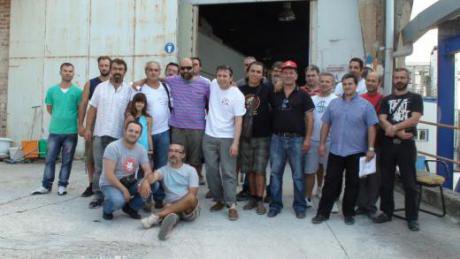A soap factory in Greece, abandoned by its owners, has been reclaimed by its workers – and provides a vital example of how things can be done differently.

As the Ecotopia Bike Tour wheeled into a sun scorched factory in Southern Thessaloniki; not only was the sun glaring but so too was the obvious need for spaces where alternatives could be realised. The spirit of our critical mass to the occupied building materials factory, Vio.me., had been dimmed by the heavy police presence (1 police car in front of us, 2 behind and motorbike alongside us) which escorted us for the entire ride through the city. However, our destination, which has been run as a democratic workers’ co-operative producing environmentally friendly washing products for eighteen months proved to be just such a space of hope.
Three years to the day, the owners of Vio.me had abandoned the factory and its 70 employees to the vicious tidal waves of austerity, unemployment and poverty which have struck Greece in the aftermath of the global financial crash. The social consequences of the crisis can be seen clearly by the fact that in 2011, the year the owners fled, suicides had increased in Greece by 40% from 2008. Our guide explained how the trade union had refused to abandon the factory and the workers who relied upon it for their livelihoods. Instead the union called a general assembly of its 45 members and declared that ‘If you [the employers] can’t, then we can.’
For three years the workers have guarded the factory, its machinery and unsold inventory twenty four hours a day, seven days a week – showing far greater responsibility towards their workplace then its legal owners. Collectively the workers decided to restart production, but rather than continue to produce their previous environmentally damaging chemical products they instead started to produce soap made from natural ingredients. Over time this soap has formed the base product of an expanding range of other environmentally friendly washing products. Such a radical project has not, though, been without its struggles; not least sectional conflict amongst the employees themselves. With the worker’s splitting on whether to start the production of soap. However, the solidarity provided by other Greek struggles, such as SOS Halkidiki, the wider Greek left and international supporters, including the worker controlled FaSinPat factory in Argentina, has provided the remaining workers with the strength to continue fighting.
It’s not only the product which has been transformed at Vio.me., so has the very nature of production and exchange. Before the occupation, workers would only learn their specific job role: limiting their daily experiences to a few fragmented, repetitive and alienating tasks. Now all the tasks are performed by all workers and everyone does the same job in its totality. Without the domination of bosses, decisions are made collectively. Without owners to exploit them the workers have been able to implement equal pay. Exchange has also been radically altered alongside production; with the workers deciding that they did not want the new product of their labour to be sold in supermarkets but instead only through solidarity networks.
Examples of alternatives such as Vio.me are so important because they demonstrate that there are possibilities beyond the status quo; that a different future is possible and worth fighting for. However, without wider systemic transformation such alternatives can only ever exist as spaces of hope carved out between the contradictions of capitalism. These contradictions will inevitably shift and change over time, and as they shift the space open to alternatives is also transformed. Vio.me. is no different and is under a number of pressures; first and foremost is the need to boost wages which are currently only 10 Euros a day – barely enough to survive on.
The major barrier to increasing pay is that, not owning the factory, the washing products can’t be stored at the site, for fear that it might be confiscated. This severely limits the scale of production and makes distribution difficult. The workers have applied to the state to be granted ownership of some of the factory but meanwhile the owners are also trying to have the courts declare Vio.me. bankrupt so that their own debts will be written off.
The response of state institutions, whether they allow the factory to be declared bankrupt and if not what constraints are placed on worker ownership and control will be crucial in determining Vio.me.’s future. Another challenge facing Vio.me. is access to finance in order to invest in new machinery and raw materials. Experience in other countries shows that capitalist financiers such as banks are often weary of providing credit to co-operatives. However, if the credit were there, co-operatives could flourish: greater access to cheap credit was a major reason for the boom in Venezuelan co-ops, from 800 co-ops in 1998 to over 30,000 by 2007. While the creation of co-operative banks to provide credit to worker co-operatives was central to the success of the Mondragon workers co-operatives in the Basque reign of Spain which now employ over 80,000 workers and the La Lega worker cooperatives in Northern Italy which employ over 400,000 workers*.
No matter the future of Vio.me., its history will always live on, along with examples of worker co-ops in Argentina, Spain, Italy and Venezuela as a valuable proof that another world, free from alienation, domination and exploitation, is possible and worth fighting for.
This article is part of the Modernise: de-privatise series.
Note: This post was originally published on opendemocracy.net on the 3rd October 2014.
